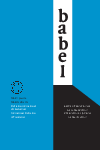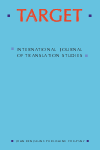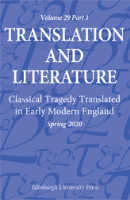
MonTI
Scope & Guideline
Catalyzing Research Excellence in Linguistics and Education
Introduction
Aims and Scopes
- Legal and Economic Translation:
Focuses on the complexities of translating legal and economic texts, considering the impact of globalization and technology on legal service provision. - Cultural and Linguistic Adaptation:
Explores how cultural nuances and linguistic differences affect translation practices, particularly in children's literature and sacred texts. - Corpus-Based Research Methodologies:
Utilizes corpus linguistics to analyze translation patterns, offering insights into language use and translation strategies across various contexts. - Interdisciplinary Perspectives:
Encourages the integration of perspectives from law, economics, sociology, and linguistics to enrich the understanding of translation and its implications. - Emerging Technologies in Translation:
Investigates the role of new technologies, including machine translation and large language models, in shaping contemporary translation practices.
Trending and Emerging
- Impact of Globalization and Technology:
Recent papers highlight the influence of globalization and technological advancements on translation practices, particularly in legal and economic contexts. - Multimodality in Translation:
There is a growing interest in how translation interacts with various modes of communication, including visual and auditory elements, especially in children's literature. - Legal Translation and Human Rights:
A notable trend toward examining translation's role in legal contexts, particularly in relation to access to justice and human rights, underscores its societal relevance. - Machine Translation and AI:
Research on the efficacy and implications of machine translation and artificial intelligence in the translation process is gaining prominence, reflecting technological advancements. - Translation and Cultural Identity:
Exploration of how translation shapes and is shaped by cultural identity is becoming a focal point, especially in discussions around children's literature and diverse narratives.
Declining or Waning
- Historical and Classical Translation Studies:
Research on ancient texts and classical languages has been less prevalent, possibly due to a growing interest in contemporary translation challenges and practical applications. - Traditional Literary Translation:
The focus on translating classic literature has diminished in favor of more modern themes, such as children's literature and multimedia translations. - Translation of Specific Text Types:
The exploration of niche text types, such as specific genres of literature, appears to be waning as broader themes gain traction. - Static Approaches to Translation Quality:
Older models of assessing translation quality, which may have been more rigid, are being replaced by dynamic and context-sensitive frameworks. - Single-Language Focused Studies:
Research that concentrates solely on one language or cultural context without considering broader interdisciplinary implications is becoming less common.
Similar Journals

Babel-Revue Internationale de la Traduction-International Journal of Translation
Elevating Translation Studies to New HeightsBabel - Revue Internationale de la Traduction - International Journal of Translation, published by John Benjamins Publishing Co, is a leading scholarly journal that has established itself as a critical platform for research in the fields of translation studies, linguistics, and communication. Since its inception in 1955, Babel has provided a forum for academic discourse and has adapted through converged years to continuously reflect the evolving landscape of translation theory and practice. The journal is recognized for its high impact, achieving a Q1 ranking in Linguistics and Language and Q2 in Communication, making it relevant for both researchers and practitioners seeking to contribute to this dynamic area of study. With significant Scopus rankings in various categories, Babel is instrumental in promoting innovative research and fostering multidisciplinary dialogue. Although it does not offer open access, the journal is accessible through numerous academic institutions worldwide, ensuring that vital insights into translation practices and theories are disseminated effectively. Researchers, professionals, and students alike will find a wealth of knowledge and groundbreaking perspectives within its pages, making Babel an essential resource in the field.

Al-Arabiyya-Journal of the American Association of Teachers of Arabic
Empowering Arabic Education through Innovative ResearchAl-Arabiyya: Journal of the American Association of Teachers of Arabic, published by Georgetown University Press, serves as a significant platform for research and scholarship in the fields of Arabic language education, linguistics, and literature. With its ISSN 0889-8731 and E-ISSN 2375-4036, this journal presents a robust blend of original articles, reflections, and pedagogical research aimed at both seasoned educators and emerging scholars. While the journal is not an open-access publication, it maintains a commendable impact in its categories, achieving Q4 in Education and Q2 in Literature and Literary Theory as per the latest rankings. Notably, it has been recognized within Scopus for its contributions to the arts and humanities, with rankings that reflect a vibrant academic discourse surrounding the Arabic language. Al-Arabiyya aims to promote and enhance the teaching and learning of Arabic while fostering an understanding of its literary and cultural richness, making it an invaluable resource for anyone interested in Arabic studies.

Target-International Journal of Translation Studies
Fostering Dialogue in Linguistic ResearchTarget - International Journal of Translation Studies, published by John Benjamins Publishing Co, stands as a leading academic forum in the fields of translation studies, communication, and linguistics. Established in 1989, this prestigious journal has successfully evolved, boasting a Q1 classification in 2023 within both Communication and Linguistics and Language categories, reflecting its significant impact and influence in these disciplines. With an impressive positioning in the Scopus ranks, it is recognized as one of the top journals in its field, being placed in the 88th percentile for Language and Linguistics, and in the 87th percentile for Linguistics and Language within the Social Sciences. Its rigorous scholarly contributions foster a greater understanding of translation practices, theories, and methodologies, making it an essential resource for researchers, professionals, and students alike. While it does not currently offer open access, its comprehensive articles and studies greatly enrich discussions and advancements in translation and communication studies.

Chuzhdoezikovo Obuchenie-Foreign Language Teaching
Fostering Global Competence through Language LearningIntroducing Chuzhdoezikovo Obuchenie - Foreign Language Teaching, a prominent journal published by NATSIONALNO IZDATELSTVO AZ BUKI, dedicated to the field of foreign language education. With its ISSN 0205-1834 and E-ISSN 1314-8508, this journal aims to provide a comprehensive platform for researchers, educators, and practitioners to share insightful studies, innovative methodologies, and transformative practices in language teaching. The journal is based in Sofia, Bulgaria and is strategically positioned to contribute to the discourse on language acquisition and pedagogy, targeting a global audience interested in enhancing foreign language competencies. Although specific impact factors and H-index data may be unavailable, the journal's commitment to quality and relevance in the field is evident through its rigorous peer-review process, ensuring that published works meet high academic standards. Emphasizing accessibility and inclusivity, Chuzhdoezikovo Obuchenie invites submissions that reflect contemporary challenges and advancements in language education, making it an essential resource for anyone invested in the future of multilingual instruction.

LFE-Revista de Lenguas para Fines Especificos
Catalyzing Dialogue in Language Studies WorldwideLFE-Revista de Lenguas para Fines Especificos is a distinguished academic journal focused on the field of applied linguistics and language education, published by UNIV LAS PALMAS GRAN CANARIA, SERV PUBL & DIF CIENT PARQUE CIENT. Established in 1993, this Open Access journal promotes the dissemination of research on specific purposes in language studies, making it an invaluable resource for researchers, educators, and students alike. Based in Spain, it serves an international audience interested in the intersection of language acquisition, pedagogy, and professional communication. Despite its recent entry into Scopus with competitive rankings in Social Sciences, particularly in Linguistics and Language and Education, the journal aims to continually enhance its impact by inviting innovative contributions that explore contemporary challenges and methodologies in language teaching and learning. Researchers are encouraged to tap into this growing repository of knowledge, which is easily accessible to foster collaborative and interdisciplinary dialogues within the field.

Panacea-Boletin de Medicina y Traduccion
Innovating Translation Practices for Medical ExcellencePanacea-Boletin de Medicina y Traduccion, published by TREMEDICA, serves as a valuable academic resource within the field of linguistics and language translation. With an ISSN of 1537-1964 and coverage from 2012 to 2023, this journal has established itself with an impressive Q2 ranking in the 2023 category of Linguistics and Language, indicating its significant contribution to the scholarly dialogue in this domain. The journal's rankings within Scopus, including the 41st percentile in Arts and Humanities and the 38th in Social Sciences, highlight its recognition and relevance among peers. Although it operates under a traditional access model, the journal remains committed to disseminating high-quality research that bridges the gap between medicine and linguistic translation, thereby enhancing interdisciplinary understanding and collaboration. For researchers, professionals, and students alike, Panacea-Boletin de Medicina y Traduccion stands as an essential publication for exploring emerging trends and fostering innovation in linguistic practices.

Quaderns-Revista de Traduccio
Cultivating Knowledge in the Heart of BarcelonaQuaderns-Revista de Traduccio, published by the Universitat Autònoma de Barcelona, is a prominent journal in the field of Linguistics and Language, which has garnered recognition for its scholarly contributions since its inception. With an ISSN of 1138-5790 and an E-ISSN of 2014-9735, this journal has maintained an active publication schedule across notable cycles, contributing valuable insights from 2011 to 2018 and continuing from 2020 to 2024. As a Q3 category journal in both Arts and Humanities and Social Sciences related to Language and Linguistics, it occupies an important niche, ranking #607 out of 1088 and #692 out of 1167 respectively. Though currently not an open-access journal, its rigorous peer-review process ensures that published articles meet high academic standards, making them relevant for researchers, professionals, and students alike. Housed in Cerdanyola del Vallès, Barcelona, this journal serves as a critical platform for the dissemination of cutting-edge translation studies and linguistics research.

Translation and Literature
Advancing Scholarship in Translation StudiesTranslation and Literature is a leading academic journal published by Edinburgh University Press, focusing on the intricate relationship between language and literature within the realms of translation studies. With an ISSN of 0968-1361 and an E-ISSN of 1750-0214, this journal provides a crucial platform for scholars and practitioners to explore and disseminate research that addresses both the theoretical and practical aspects of translation. Since its inception in 1996, Translation and Literature has established itself as an essential resource, particularly noted for its contributions to the fields of linguistics and literary theory, as indicated by its Q4 ranking in both categories in 2023. The journal's articles are designed to foster dialogue across disciplines, encouraging innovative thinking and collaboration among researchers, professionals, and students alike. Access to this valuable resource is currently available through subscription, ensuring high-quality scholarship reaches a diverse audience dedicated to advancing the understanding of translation's role in literature.

Estudios de Linguistica-Universidad de Alicante-ELUA
Shaping the Future of Linguistics, One Study at a TimeEstudios de Linguistica-Universidad de Alicante-ELUA is a distinguished academic journal dedicated to advancing the field of linguistics, published by Universidad de Alicante. With an Open Access model adopted since 2020, ELUA facilitates greater accessibility to pioneering research for scholars and enthusiasts alike. The journal's ISSN is 0212-7636 and its E-ISSN is 2171-6692, ensuring it is indexed and easily discoverable in academic databases. Though the journal's H-Index is currently not specified, its commitment to disseminating high-quality linguistics research positions it as a valuable resource for researchers, professionals, and students. The journal aims to foster scholarly dialogue and innovation in various linguistic domains, making it an essential platform for sharing insights and findings that shape contemporary linguistic studies. Based in Alicante, Spain, ELUA is poised to contribute significantly to the global linguistics landscape.

Current Trends in Translation Teaching and Learning E
Shaping the Future of Translation StudiesCurrent Trends in Translation Teaching and Learning E is a premier open access journal published by UNIV HELSINKI, DEPT MODERN LANGUAGES, dedicated to advancing the field of translation studies. With an ISSN of 2342-7205, this journal has been providing a crucial platform for researchers, educators, and practitioners since 2010. The journal focuses on the latest methodologies, pedagogical innovations, and theoretical discussions related to translation and language education, making it an essential resource for professionals and students alike. By fostering an environment of open knowledge exchange, Current Trends in Translation Teaching and Learning E significantly contributes to the intellectual discourse in this vital field, ensuring that contemporary practices keep pace with the evolving landscape of global communication. The journal is poised to maintain its relevance and impact, providing a rich repository of research that reflects the dynamic and diverse nature of translation today.